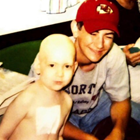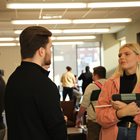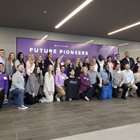“The true sign of intelligence is not knowledge, but imagination.” This quote, attributed to Albert Einstein, epitomizes Donald Keating and his desire to balance the demands of his studies with his passion for innovation and creativity.
Keating first fulfilled that desire by serving as the co-designer for KCU’s inaugural issue of PULSE, an art and literary publication produced solely by students. Next? The third-year medical student attending KCU’s Kansas City campus collaborated with a pioneering team from Stanford University to develop a novel vertigo monitor.
To become part of the innovative team producing the monitor, Keating pursued an intensive 10-week internship under the direction of Peter Santa Maria, MD, PhD, and Kristen Steenerson, MD, clinician-scientists at Stanford Otolaryngology – Head & Neck Surgery. In addition to Keating, the team included engineers and product designers.
During his internship, Keating spent time at the Stanford Ear Institute seeing patients afflicted with recurring dizziness to build his understanding of the epidemiology behind the types of dizziness the team aimed to help diagnose. Through their ongoing research, they found that 60 percent of the dizzy attack patients they surveyed had no definitive diagnosis.
Keating has crafted a user guide and questionnaire for patients participating in the clinical trial. Still under development, the wearable electronystagmography (ENG) will revolutionize how dizziness attacks are monitored, providing real-time data and facilitating faster diagnoses for those with recurrent dizziness.
Keating explains it like this: “It’s essentially a Holter monitor for the dizzy patient,” he said. “Just as a Holter monitor captures the heart's rhythms over a day or two while patients maintain their usual activities, providing clues to diagnose arrhythmias, our ENG device is designed to do something similar for those experiencing dizziness,” he continued.
Some causes of dizziness can be induced in a clinical setting, where a doctor may position the patient or move their head to trigger the symptoms. However, dizziness often occurs spontaneously and cannot always be replicated during a consultation, making it challenging for physicians to capture real-time data on dizzy attacks. The innovative at-home dizzy attack monitor changes this dynamic.
Patients will be able to use the wearable ENG device to collect various physiological signals and log each incident of dizziness. For the first time, physicians will have access to real-time data on dizzy attacks as they occur in the patient’s natural environment. This breakthrough has the potential to reduce the number of office visits, lower healthcare costs, and expedite the journey to accurate diagnosis and effective treatment.
Keating’s ongoing experience with Stanford led to an opportunity to represent the team at the American Academy of Otolaryngology – Head and Neck Surgery’s ENTrepreneur Faceoff where he was awarded the coveted People’s Choice Award. The team has gained additional exposure with acceptance to the Innovation World Cup®, the world’s leading competition for wearable and deep tech startups. Since then, his work with the team continues as they work to produce the next phase of prototypes.
How does it feel to be involved in developing a product with such groundbreaking potential? Keating says he feels grateful. “I am grateful to Dr. Santa Maria who has opened this door to me and inspired me to pursue medical innovation. I have formed some incredible relationships through this experience and am thankful to the entire team,” he said. “Being a medical student in a room of biotech engineers and clinician-scientists who are developing a first-of-its-kind device that could improve the lives of countless people is both humbling and gratifying."
_20231215165644_0.png)



(0) Comments